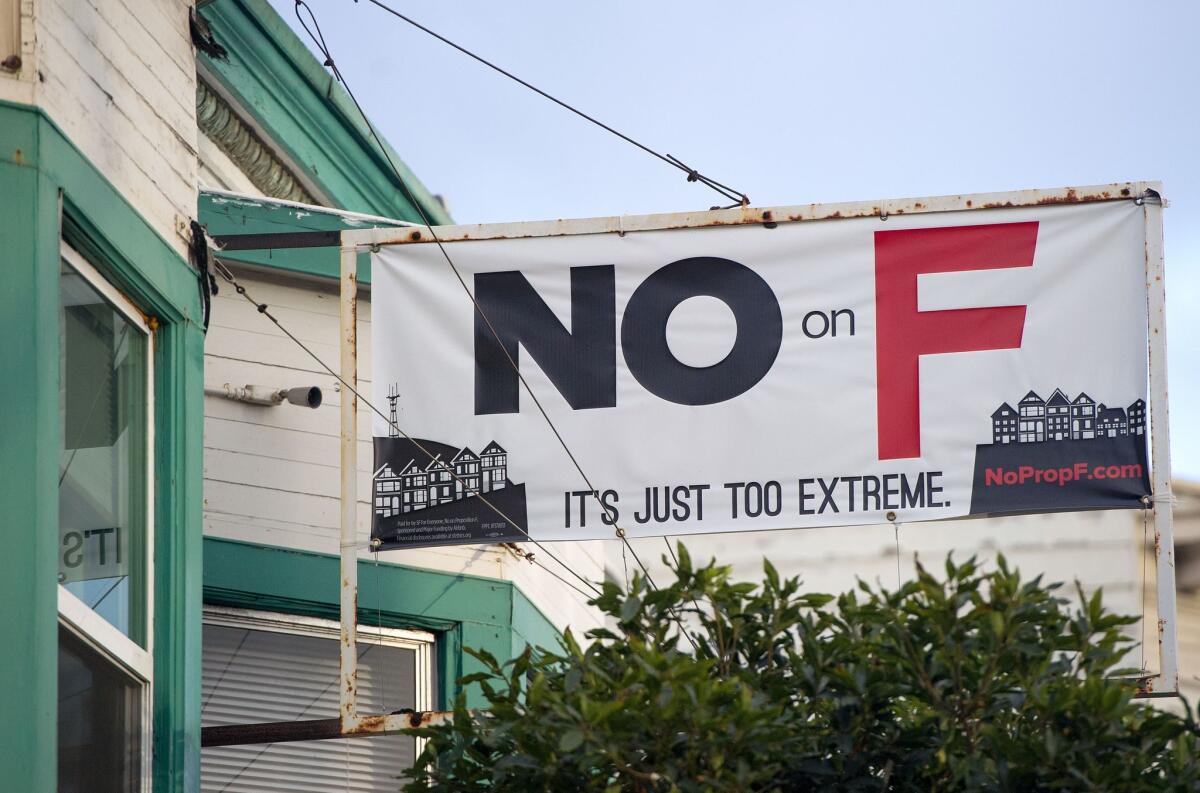Editorial: What Airbnb’s Bay Area win means for L.A.

A sign showing opposition to Proposition F is hoisted over a shop in San Francisco on November 2.
- Share via
With sky-high housing costs and widespread resentment toward tech-industry-fueled gentrification, San Francisco would seem like fertile ground for a ballot initiative to throttle a local tech upstart accused of worsening the housing shortage: Airbnb, the online service that enables people to offer their dwellings for short-term rentals. On Tuesday, however, city voters soundly rejected such a proposal, leaving in place the more modest rules that county supervisors previously adopted. L.A. officials, who are considering their own ordinance to regulate short-term rentals, should take note of the line those voters have drawn.
The latest tech boom has caused a surge in San Francisco’s population that has outstripped the painfully slow growth in its housing supply. Predictably, mortgages and rents have surged as well; the city ranks just below the San Jose area as the least affordable place to own a home, and its rents are higher than in any other large U.S. city. The number of available dwellings is critically important there, just as it is in Los Angeles. That’s why, when the supervisors legalized short-term home-sharing rentals last year, they limited the days per year that unoccupied units could be offered as short-term rentals, effectively barring such properties from being converted into hotel rooms.
That wasn’t enough for some Airbnb critics. Led by a hotel workers union, whose employers compete with Airbnb, they put Proposition F on the city ballot and sold it as a way to stop the super-rich from profiting at the expense of affordable housing — an insult to the estimated 140,000 residents who were Airbnb hosts or users. The proposition would have required hosts to divulge sensitive information, exposed them to a minefield of bureaucratic requirements and allowed neighbors to sue hosts whom the city had found to be in compliance.
Tuesday’s vote shows the broad public support for short-term rentals, as well as the public’s distaste for draconian regulation in this arena. As the L.A. City Council mulls these issues, it should learn from San Francisco’s experience, while also heeding the shortcomings of the rules the supervisors have been struggling to make effective. Those rules require hosts to jump through so many hoops to register, only a fraction have done so, leaving a huge gap in regulation and enforcement. The right approach would include measures to deter long-term housing from being converted into short-term rentals, to collect occupancy taxes from hosts and to enable effective enforcement against illegal rentals and neighborhood nuisances. It would not, however, involve rules so cumbersome and intrusive that hosts continue renting out their units as they do today, off the city’s radar in the wild and woolly underground economy.
Follow the Opinion section on Twitter @latimesopinion and Facebook
More to Read
A cure for the common opinion
Get thought-provoking perspectives with our weekly newsletter.
You may occasionally receive promotional content from the Los Angeles Times.









